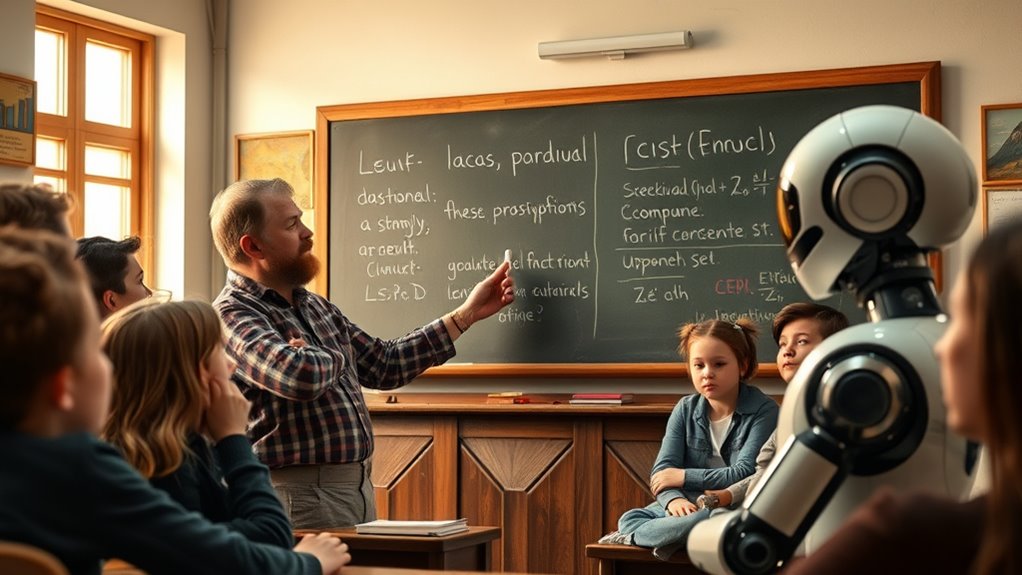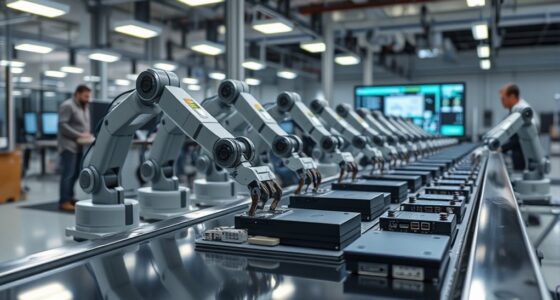You’ll find humans excel most in roles needing emotional intelligence, moral judgment, creativity, and physical adaptability. Tasks like mentoring, negotiation, and cultural expression rely on genuine empathy and nuanced understanding. You’re better suited for unpredictable environments and complex decision-making that demand intuition and moral insight. As AI advances, these uniquely human skills remain essential, allowing you to do what machines can’t replicate—if you stay curious, you’ll discover more about the future of work.
Key Takeaways
- Humans excel at genuine empathy, emotional insight, and building trust in personalized support and caregiving roles.
- Ethical judgment, moral reasoning, and navigating complex cultural nuances remain uniquely human skills.
- Creative expression, artistic interpretation, and cultural preservation rely on personal emotion and contextual understanding.
- Handling unpredictable, high-stakes environments requires real-time decision-making, physical adaptability, and sensory feedback humans provide.
- Building authentic human connections fosters resilience, emotional bonds, and meaningful relationships AI cannot fully replicate.
Roles Requiring Emotional Support and Empathy

Roles that require emotional support and empathy are essential in helping people navigate life’s challenges. You provide comfort, understanding, and personalized guidance that AI can’t replicate. Whether you’re a social worker, counselor, or healthcare professional, your ability to connect emotionally makes a real difference. As social complexities grow and crises emerge, your skills become even more crucial. Education programs emphasize ethical integrity and evidence-based approaches, ensuring you develop genuine empathy. Online learning supports your growth, making it easier to enter and stay in these compassionate roles. Your human connection improves lives, especially for vulnerable populations. You’re the bridge that offers trust, reassurance, and tailored support—qualities that technology alone can’t provide, making your role irreplaceable in today’s evolving landscape. The demand for human skills like empathy and emotional intelligence is expected to rise significantly by 2030. Additionally, understanding narcissistic behavior can help professionals better support individuals affected by toxic relationships, further emphasizing the importance of emotional insight in caregiving roles. Recognizing the law of attraction can also enhance your ability to foster positive environments and promote well-being in your clients. Developing diverse designs in your approaches can further strengthen your effectiveness in these vital roles. Incorporating knowledge about indoor air quality and the benefits of air purifiers can also contribute to creating healthier environments for your clients and yourself.
Teaching and Mentoring in Personalized Contexts

You play a crucial role in building emotional connections with your students, which AI can’t replicate. Personalizing learning requires not just adapting content but also understanding moral and ethical guidance that shapes character. As technology advances, your human touch remains essential for mentoring in truly personalized contexts. Increasing implementation of AI tools across educational institutions worldwide underscores the importance of human educators in providing empathy and moral support that machines cannot emulate. Moreover, fostering Cultural Intelligence enables educators to better understand diverse student backgrounds, creating more inclusive and effective learning environments.
Emotional Connection Building
Building emotional connections in teaching and mentoring is essential for fostering meaningful learning experiences. When you connect emotionally, students feel valued and understood, boosting their engagement and motivation. Personalization enhances this bond, allowing you to tailor emotional support based on individual needs. Research shows that students involved in SEL programs outperform their peers academically and socially, which underscores the importance of emotional connections in education. Developing emotional intelligence is a key aspect of this process, as it helps both educators and students navigate social dynamics more effectively. Cultivating empathetic skills enables mentors and teachers to better respond to students’ emotional states and foster trust. Develop trust through empathy and openness. Use social-emotional learning programs to strengthen emotional intelligence. Recognizing and addressing negative emotions to maintain a positive environment is crucial, as it fosters a sense of safety and belonging that supports learning. Provide ongoing emotional support to build resilience and confidence. These connections shape not just academic success but also personal growth. Mentors who build strong bonds inspire long-term development, while teachers with emotional awareness create a classroom atmosphere that promotes trust and enthusiasm. Incorporating innovative materials from the latest sneaker trends can serve as a relatable way to connect with students’ interests, making emotional bonds even more effective. Understanding the influence of celebrity culture, like Bollywood legends or modern influences, can also help educators relate to students’ interests and foster engagement. Building trust remains a uniquely human skill, crucial for meaningful education.
Adaptive Learning Personalization
Adaptive learning personalization harnesses data-driven AI tools to tailor educational content to each student’s unique needs, making learning more effective and engaging. By using continuous assessments and feedback loops, you can adjust instruction in real-time, ensuring students receive support suited to their progress. This approach is scalable across K-12, higher education, and adult learning, demonstrated by implementations in 78 countries worldwide. It boosts motivation—75% of students feel more engaged—and improves academic outcomes, with math scores rising up to 8 percentile points annually. Course completion rates jump by 70%, and dropout rates drop by 15%. Additionally, educational data mining can help identify patterns in student learning behaviors to further refine personalization strategies. This technology also enables educators to predict learning challenges before they become critical, allowing for proactive support. While AI handles content delivery and analytics, human teachers remain essential for interpreting complex behaviors, addressing non-cognitive needs, and providing personalized mentorship, ensuring long-term success. Studies show that students in personalized programs perform 30% better on standardized tests than those in traditional classrooms. Moreover, understanding alimony laws and the legal aspects of divorce can help educators and students navigate emotional and financial challenges during transitional periods, emphasizing the importance of comprehensive support systems in educational settings. Incorporating deliberate human intervention ensures that personalized learning environments foster emotional well-being and holistic development alongside academic achievement. Recognizing the importance of community and resource networks can further enhance the effectiveness of personalized education by providing additional support and stability.
Moral and Ethical Guidance
As personalized learning environments become more sophisticated through AI, addressing moral and ethical guidance remains a human responsibility. You play a vital role in contextualizing ethics, leveraging empathy, and adapting guidance to individual backgrounds. Humans are better at navigating complex moral dilemmas, considering cultural nuances, and providing personalized feedback that builds trust. AI can analyze data and follow rules, but it struggles with the ambiguous and dynamic nature of ethics. Your ability to interpret values like dignity, fairness, and justice is essential. Public trust depends on human oversight, especially as societal expectations grow. You’re needed to:
- Contextualize moral values based on personal experiences
- Model empathy and compassion effectively
- Adjust guidance for cultural differences
- Ensure accountability and ethical standards are upheld
Furthermore, the limitations of AI in understanding human morality highlight the importance of human judgment in these sensitive areas. Developing an understanding of the nuanced effects of UV exposure on skin health is crucial for providing accurate and responsible guidance on tanning practices, which AI currently cannot fully grasp. Recognizing the operating hours of entertainment venues is also important for advising individuals on planning visits and managing expectations when engaging in leisure activities. Additionally, ethical decision-making in complex scenarios remains a uniquely human skill that ensures moral considerations are appropriately prioritized over algorithmic outputs. It is also vital to stay informed about current news in Indonesia to understand the societal context in which ethical standards are applied, ensuring guidance remains relevant and respectful of local values.
Negotiation, Persuasion, and Interpersonal Skills

Negotiation, persuasion, and interpersonal skills remain distinctly human strengths because they rely on emotional intelligence and the ability to read subtle cues. You can interpret body language, tone, and unspoken signals, which helps build trust and rapport. Empathy allows you to adapt your approach to meet individual needs, fostering long-term relationships rather than just closing deals. You navigate cultural nuances and unspoken norms, adjusting strategies in real time as circumstances shift. Your ability to improvise solutions and craft compelling narratives through storytelling makes your influence more persuasive than data alone. These skills depend on credibility, charisma, and understanding, qualities that AI cannot replicate. Ultimately, your capacity to connect emotionally and adapt situationally keeps these skills essential in human negotiations.
Creative Professions and Cultural Expression

You can’t replicate genuine artistic inspiration or the deep cultural understanding that human creators bring to their work. Artists use intuition and personal experience to craft meaning that resonates on a profound level, something AI can’t match. It’s this cultural nuance and emotional sensitivity that make creative professions uniquely resilient in an automated world. Creative fields rely on subjective judgment and originality, which are difficult for AI to emulate or replace.
Genuine Artistic Inspiration
Genuine artistic inspiration springs from the depths of human experience, drawing on personal emotion, cultural background, and individual perspective. You create works that reflect your unique insights, shaped by years of practice, failures, and experimentation. Your ability to surprise and innovate allows you to break conventions and offer unexpected interpretations with emotional depth. As you grow artistically, self-reflection deepens your work’s meaning, weaving complex feelings, memories, and cultural context into layered expressions.
- Draw from personal history, emotion, and real-world experience
- Develop a distinctive voice through years of practice and experimentation
- Break norms with innovative, emotionally resonant ideas
- Use self-reflection to deepen artistic meaning
Cultural Nuance and Sensitivity
Cultural nuance and sensitivity are essential in creative professions because they guarantee that cultural expressions are portrayed with respect and authenticity. AI often struggles with these subtleties, leading to biased or oversimplified representations. Many datasets lack diversity, causing AI to reinforce stereotypes or misrepresent complex cultural practices. AI’s pattern recognition can’t fully grasp subjective experiences or the middle ground in cultural debates, resulting in extreme or inaccurate portrayals. This oversimplification hampers authentic cultural expression and risks misinforming audiences. Human creators bring critical cultural insight and sensitivity that AI cannot replicate. Developing culturally inclusive AI and training systems on diverse, sensitive data are fundamental steps. Ultimately, humans remain essential for capturing the richness, complexity, and respect that genuine cultural expression demands.
Complex Strategic Decision-Making and Ethical Judgments

How effectively can artificial intelligence navigate the complexities of strategic decision-making and ethical judgments? Not very well, actually. AI struggles with understanding full contexts, so human oversight remains essential to guarantee decisions align with values. Data limitations mean AI’s effectiveness depends on quality sources, whereas humans draw from diverse information. Ethical judgment is another area where humans excel, applying moral reasoning and understanding societal implications. Additionally, humans are better at adapting to sudden market shifts and managing risks involving complex variables. Consider these points:
- Contextual understanding remains a challenge for AI
- Ethical insight and moral reasoning are uniquely human
- Humans adapt more quickly to changing circumstances
- Decision accountability still lies with people
AI can support, but it can’t fully replace human judgment in these critical areas.
Hands-On Technical Work and Skilled Trades

As automation and new technologies reshape the landscape of strategic decision-making, the demand for hands-on technical work and skilled trades continues to surge. You’ll find job growth driven by a 376% increase in hiring from late 2024 to early 2025, amid persistent labor shortages caused by retirements and fewer new entrants. Skilled trades offer strong job security, especially with public infrastructure projects boosting opportunities. Many roles now require working with cutting-edge tech, such as smart building systems and green energy solutions, demanding ongoing technical training. Certifications like EPA 608 or NEC code knowledge are standard pathways to stable employment through apprenticeships. Higher wages, benefits, and career advancement make skilled trades attractive, especially as experienced workers retire and automation targets routine tasks.
Jobs Involving Physical Dexterity and Unpredictable Environments

Jobs that demand high physical dexterity and adaptability thrive in unpredictable environments because they rely on real-time decision-making and bodily coordination. You need to respond instantly to changing conditions, making human judgment irreplaceable. Consider these roles:
- Forest firefighters and emergency responders swiftly adapt to shifting hazards, requiring agility and resilience.
- Construction workers and outdoor maintenance crews navigate unpredictable terrains that demand flexibility and situational awareness.
- Dancers and athletes demonstrate complex coordination, balancing balance and precision amid dynamic stimuli.
- Disaster relief personnel operate in high-stress, fluid scenarios, where quick reflexes and physical endurance are essential.
These jobs depend heavily on physical resilience, quick thinking, and sensory feedback, making automation difficult. AI struggles to replicate the spontaneity and nuanced decision-making that these roles demand.
Emerging Careers in AI Oversight and Ethical Governance

With AI systems becoming integral to industries from finance to healthcare, there’s a rapidly growing need for professionals who can oversee and govern their use responsibly. Job postings for roles like AI ethics officers and AI governance managers are increasing, especially in tech and finance sectors. Over 9.5% of software development jobs now include AI oversight responsibilities, driven by widespread adoption in banking, supply chains, and customer service. Major banks such as JPMorgan and Wells Fargo have boosted AI headcount by 13% in six months, including oversight roles. Regulatory frameworks are still evolving, making compliance specialists essential for data privacy, bias mitigation, and transparency. Skills in AI literacy, ethics, law, and model evaluation are highly valued, and these roles are expanding beyond tech into healthcare, manufacturing, and government, reflecting their growing importance.
Tasks Demanding Human Intuition and Problem-Solving

Human intuition plays a crucial role in tasks that require rapid, nuanced judgment, especially when data is incomplete, ambiguous, or evolving. Your intuition helps you identify subtle patterns, interpret complex information, and make decisions when algorithms might fall short. Skilled practitioners rely on intuitive judgment to critically evaluate machine outputs, avoiding blind trust. It also guides hypothesis generation and prioritization amid uncertainty.
Human intuition is vital for nuanced judgment and critical evaluation when data is incomplete or ambiguous.
Consider these key aspects:
- Recognizing exceptions and anomalies in changing environments
- Making ethical, value-based decisions amid social complexities
- Adapting creatively during unforeseen challenges
- Integrating emotional and social context often missing in AI outputs
Your ability to synthesize disparate information quickly and intuitively remains essential in complex decision-making, problem-solving, and steering through ambiguity where AI still struggles.
Roles Built on Unique Human Experiences and Cultural Nuance

Roles built on unique human experiences and cultural nuance thrive because they rely on deep personal insights, emotional understanding, and contextual awareness that machines can’t replicate. You excel in cultural preservation, interpreting artifacts, and managing heritage, where sensitivity and cultural knowledge are essential. In creative fields, you craft art, literature, and music that reflect complex human emotions and cultural identities, which AI struggles to authentically reproduce. Your empathy and cultural awareness are indispensable in counseling, social work, and community development, enabling genuine connections and effective support. Additionally, your nuanced understanding guides ethical decision-making, policy development, and human rights advocacy, ensuring respect for diverse norms. Ultimately, interpreters and translators depend on your ability to grasp subtle linguistic and cultural cues, making your skills irreplaceable.
Frequently Asked Questions
How Will AI Impact Jobs Requiring Emotional Intelligence in the Future?
You might worry AI will take over jobs needing emotional intelligence, but it’s unlikely to fully replace them. AI can assist with tasks like data analysis, but genuine empathy, trust-building, and social skills remain human strengths. In the future, you’ll find that emotional intelligence will be even more valuable, helping you connect with others, resolve conflicts, and innovate—areas where AI still struggles to replicate authentic human understanding.
Can AI Truly Replace the Creative Storytelling and Cultural Expression Done by Humans?
Imagine a painter trying to replicate Van Gogh’s passion—AI may mimic brushstrokes but lacks his soul. You see, AI can’t truly capture human creativity and cultural nuances. It relies on patterns, missing the surprises and depth that come from personal experience. While AI can assist, it can’t replace the emotional resonance, originality, or cultural richness you bring to storytelling, making human touch irreplaceable in creative expression.
What Roles Will Demand Human Moral Judgment That AI Cannot Perform?
You’ll find that certain roles demand moral judgment AI just can’t perform. These include steering complex social interactions, understanding emotional and cultural nuances, and resolving ethical uncertainties. You’re better at making nuanced decisions rooted in empathy, intuition, and personal responsibility. When moral dilemmas involve accountability or personal relationships, your ability to contemplate context and emotions far surpasses what AI can grasp or replicate.
Will AI Ever Develop Genuine Empathy or Emotional Understanding?
You might find it surprising, but AI models like ChatGPT-4 outperform humans in standard emotional intelligence tests. However, they don’t develop genuine empathy because they rely on pattern recognition, not conscious experience. While AI can simulate emotional responses, it lacks true feelings and shared lived experiences. So, no, AI won’t develop authentic empathy or emotional understanding, as real emotional depth requires human consciousness and subjective experience AI simply can’t replicate.
How Will Human Skills Adapt in Trades Needing Tactile Judgment and Physical Dexterity?
You’ll find that trades requiring tactile judgment and dexterity will keep humans valuable because of your ability to adapt and feel subtle forces. You rely on body-centered spatial awareness and sensory feedback, which AI struggles to replicate. Your skills in fine motor control, problem-solving in unpredictable environments, and continuous tactile perception give you an edge, making your craftsmanship irreplaceable even as technology advances.
Conclusion
While AI continues to advance, you’ll find that jobs needing empathy, creativity, and human intuition remain unmatched. Some might say AI could handle everything someday, but your ability to connect emotionally, make complex ethical judgments, and adapt to unpredictable situations is irreplaceable. These qualities define what you do best—things no machine can truly replicate. So, embrace your unique skills; the human touch still holds the power to lead and inspire in ways AI can’t imitate.









